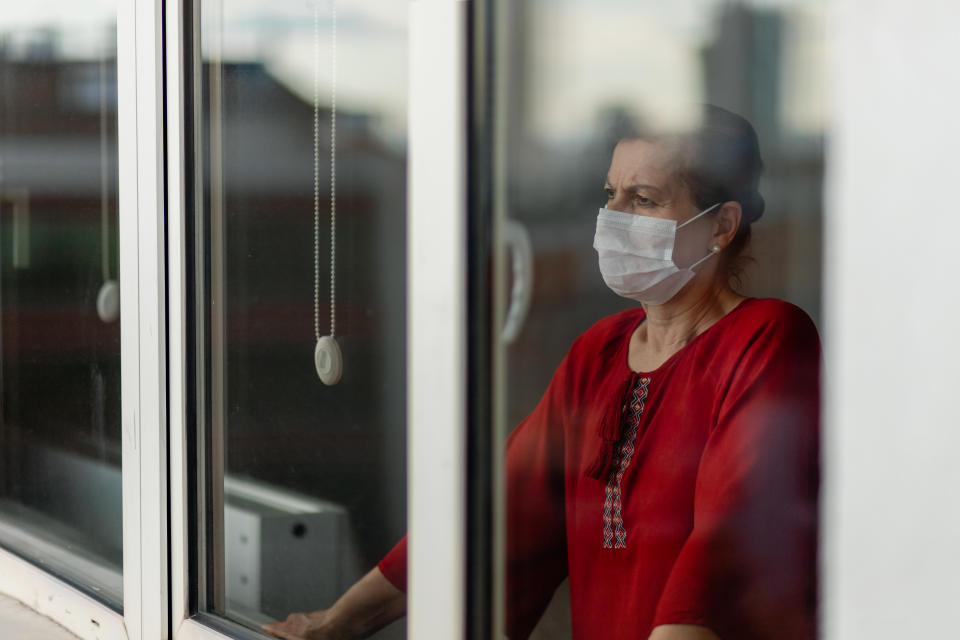Study: COVID infection raises risk of anxiety, depression
COVID-19 patients may have a higher risk of being diagnosed with a mental illness, such as an anxiety disorder or depression, according to a new study published in the journal the Lancet.
For the study, researchers reviewed the electronic health records of more than 69 million patients, including more than 60,000 patients who had been diagnosed with COVID-19 between Jan. 20 and Aug. 1, 2020. The researchers found that, within 14 to 90 days after surviving COVID-19, nearly 20 percent of patients were more likely to be diagnosed with a psychiatric condition, such as anxiety or depression, than those who experienced other health events, including the flu and fractures. Nearly 6 percent of those patients received a psychiatric diagnosis for the first time.

The study also found that people diagnosed with a mental health condition during the previous year were more likely to develop COVID-19.
So what’s the possible connection between a COVID-19 infection and a psychiatric diagnosis? “It’s possible that the virus or our immune response to it has a direct effect on the brain, but more likely it [has] to do with the stress of knowing you have had COVID and all the implications that go with that,” Paul Harrison, lead author of the study and professor of psychiatry at the University of Oxford, tells Yahoo Life.
Harrison says it’s not yet clear why patients with a history of psychiatric conditions appear to have a higher risk of COVID-19. “It could be that the psychiatric illness itself leaves people vulnerable,” he says, “or that people with a psychiatric illness might differ in their lifestyle, surroundings, etc., and it’s the latter which explains the association with COVID.”
Dr. Kevin Johns, assistant clinical professor of psychiatry at the Ohio State University Wexner Medical Center, who was not involved in the study, tells Yahoo Life that there are “many potential ways” that COVID-19 could contribute to psychiatric illness.
“When people are diagnosed with a serious illness like COVID-19, they commonly experience a lot of anxiety and uncertainty about all aspects of their lives,” he explains. “When people are acutely ill from COVID-19, they may become cut off from their family and other supports due to the need to isolate. The need to isolate can also jeopardize people’s livelihoods. Even after they recover from the acute infection, some patients experience long-lasting physical, emotional or cognitive effects that can interfere with their day-to-day lives.”
Johns explains that all this stress can “increase a person’s risk of developing a psychiatric condition such as an anxiety disorder or a mood disorder.” In some cases, people who require critical care in hospital ICUs can even develop “posttraumatic stress disorder from their harrowing experiences,” he says.
The SARS-CoV-2 may also “directly or indirectly” injure a person’s brain, according to Johns. “For example, patients with COVID-19 are at increased risk of neurological complications like strokes or encephalitis,” says Johns. “These complications are often accompanied by psychiatric symptoms. Because the virus is so new, we do not know yet if there are other ways that the virus might impact a brain’s ability to regulate anxiety or mood.”
This isn’t the first study to look into the psychological effects of COVID-19 infections. In an October study, more than 400 adults who had been diagnosed with COVID-19 were screened for psychiatric symptoms one month after being treated at hospitals. The researchers found that more than 40 percent reported experiencing anxiety, 40 percent said they had suffered from insomnia, more than 30 percent experienced depression, and nearly 30 percent reported symptoms of posttraumatic stress disorder. The study also found that women “suffered more for both anxiety and depression.”
Those study authors called the impact of the viral infection on mental health “alarming,” and noted that “higher than average incidence of PTSD, major depression and anxiety” is “expected” in COVID-19 survivors.
The Centers for Disease Control and Prevention states that the coronavirus pandemic, in general, is stressful. According to the agency, “Fear and anxiety about a new disease and what could happen can be overwhelming,” which can worsen chronic physical and mental health conditions, as well as make it difficult to sleep. The CDC states that being infected with COVID-19 can understandably cause “fear and worry about your own health and the health of your loved ones,” along with concerns about getting reinfected.
It’s not yet clear whether these mental health conditions will persist long-term. But in the meantime, what can be done to help mitigate the psychological consequences some COVID-19 patients experience? “We would expect the usual psychological treatments to be effective against anxiety and depression,” says Harrison. “The key thing is that health services are well resourced and available ... [including] for everyone else who has mental health consequences of the COVID era, even if they’ve not had COVID itself.”
Johns says that “COVID-19 can have powerful and lasting effects on emotions and cognition.” He encourages people to talk to their doctors if they’re struggling with changes in mood, anxiety, memory or concentration after being diagnosed with COVID-19. “Health care providers should also be prepared to screen for these conditions and provide interventions that integrate a person’s physical health and behavioral health needs,” he says.
Read more from Yahoo Life:
Want lifestyle and wellness news delivered to your inbox? Sign up here for Yahoo Life’s newsletter.

